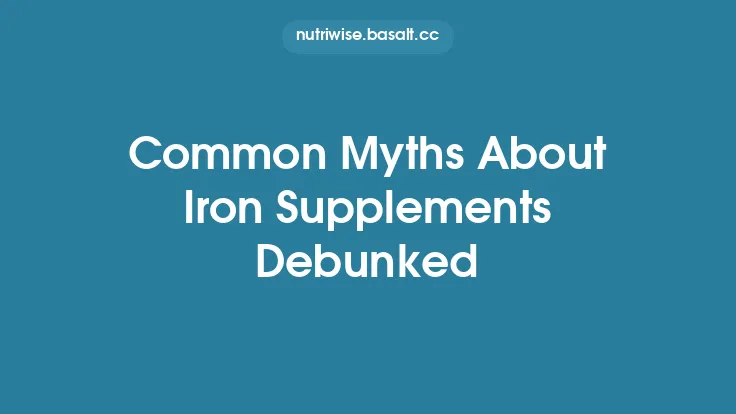Protein supplements have become a staple on the shelves of gyms, health stores, and online marketplaces. Their popularity is fueled not only by marketing campaigns but also by a flood of anecdotal claims that circulate on forums, social media, and even among well‑meaning friends. While many athletes and recreational exercisers benefit from the convenience and consistency that protein powders provide, the conversation is also riddled with misconceptions that can lead to confusion, unnecessary fear, or wasted money.
In this article we will systematically address the most prevalent myths surrounding protein supplementation. By grounding each claim in current scientific understanding, we aim to give readers a clear, evergreen perspective that can be applied regardless of training experience, dietary preferences, or fitness goals.
Myth 1 – “The More Protein I Take, the Faster I’ll Build Muscle”
The reality: Muscle hypertrophy is driven by a combination of mechanical tension (training stimulus), adequate protein intake, and sufficient recovery. However, the relationship between protein dose and muscle protein synthesis (MPS) follows a dose‑response curve that plateaus after a certain point.
Research consistently shows that, for most adults, ingesting 20–30 g of high‑quality protein in a single feeding maximally stimulates MPS. Consuming additional protein beyond this threshold does not further increase the acute MPS response; instead, the excess is oxidized for energy or stored as fat.
Therefore, “more is better” only applies when total daily protein needs are not yet met. Once you reach the recommended range of 1.4–2.2 g·kg⁻¹·day⁻¹ (depending on training volume and goals), adding extra supplement servings offers diminishing returns and may simply increase caloric intake.
Myth 2 – “Protein Supplements Are Bad for My Kidneys”
The reality: Concerns about renal stress stem from studies on patients with pre‑existing kidney disease who were placed on very high‑protein diets (often > 2.5 g·kg⁻¹·day⁻¹). In healthy individuals, multiple well‑controlled trials have found no adverse effects on kidney function from protein intakes up to 2.5 g·kg⁻¹·day⁻¹ over periods of several months.
The kidneys naturally increase glomerular filtration rate (GFR) to handle higher nitrogen loads, a physiological adaptation that does not equate to damage. However, individuals with known renal impairment should consult a healthcare professional before significantly increasing protein intake, supplement or not.
Myth 3 – “All Protein Powders Are Loaded with Hormones and Steroids”
The reality: The majority of commercially available protein powders are produced under Good Manufacturing Practices (GMP) and are subject to regulatory oversight that prohibits the intentional addition of anabolic agents. Random testing by independent laboratories has shown that the prevalence of prohibited substances in mainstream protein powders is extremely low.
That said, contamination can occur in products that are not third‑party tested. Choosing brands that provide certificate of analysis (COA) documentation from reputable testing agencies (e.g., NSF Certified for Sport, Informed‑Sport) reduces the risk of inadvertent exposure to banned substances.
Myth 4 – “Protein Supplements Are Only for Bodybuilders”
The reality: While bodybuilders often use protein powders to meet high daily protein targets, the utility of supplementation extends to anyone who struggles to achieve adequate protein through whole foods alone. This includes:
- Older adults who experience anabolic resistance and may benefit from a convenient protein boost to preserve lean mass.
- Vegetarians and vegans who may find it challenging to reach optimal protein levels without careful meal planning.
- Individuals with high energy expenditures (e.g., endurance athletes, military personnel) who need to balance carbohydrate and protein intake without excessive food volume.
Thus, protein supplements are a tool for diverse populations, not an exclusive resource for a single sport or physique goal.
Myth 5 – “You Must Take Protein Powder on an Empty Stomach for It to Work”
The reality: The timing of protein ingestion relative to meals or training is less critical than once believed. While consuming protein shortly after resistance training can modestly enhance MPS, the overall daily protein distribution matters more. Studies comparing immediate post‑exercise ingestion with delayed intake (up to several hours) have found no significant differences in muscle growth when total daily protein is matched.
If taking a shake on an empty stomach is inconvenient or causes gastrointestinal discomfort, it is perfectly acceptable to consume it with a small snack or as part of a mixed meal.
Myth 6 – “Protein Powders Cause Unwanted Weight Gain”
The reality: Weight gain occurs when energy intake exceeds expenditure. Protein powders, like any other macronutrient source, contribute calories. If you add a 120‑calorie shake to a diet that is already at maintenance, you will gain weight—regardless of whether those calories come from protein, carbs, or fat.
Conversely, protein’s high thermic effect (approximately 20–30 % of its caloric value) and its satiating properties can actually support weight management when used to replace less protein‑dense foods or to help control hunger.
Myth 7 – “All Protein Supplements Are Created Equal”
The reality: Not all powders have the same amino acid profile, digestibility, or bioavailability. While we are not delving into specific protein sources, it is still important to recognize that manufacturing processes (e.g., filtration, hydrolysis) affect how quickly amino acids appear in the bloodstream.
A supplement that is highly purified and low in anti‑nutritional factors will generally be absorbed more efficiently than one that contains significant amounts of filler, added sugars, or poorly processed protein. This does not mean you must chase the most expensive product, but it does underscore the value of transparent ingredient lists and minimal additives.
Myth 8 – “If I Eat Enough Whole Foods, I Don’t Need Supplements”
The reality: Whole foods are undeniably the gold standard for nutrition, offering fiber, micronutrients, and phytochemicals that powders lack. However, practical constraints—such as limited meal preparation time, appetite suppression after intense training, or dietary restrictions—can make it difficult to consistently meet protein targets through food alone.
In such scenarios, a protein supplement serves as a convenient, low‑volume source that helps bridge the gap without compromising overall diet quality. The key is to view the supplement as a complement, not a replacement, for nutrient‑dense meals.
Myth 9 – “Protein Supplements Are Unsafe Because They Contain Artificial Sweeteners”
The reality: Many flavored protein powders use low‑calorie sweeteners (e.g., sucralose, stevia) to improve palatability. The majority of peer‑reviewed research indicates that these sweeteners are generally recognized as safe (GRAS) at the levels used in foods and beverages.
Individual tolerance varies; some people experience mild gastrointestinal upset with certain sweeteners. If you notice discomfort, opting for an unsweetened or naturally sweetened version (e.g., using fruit puree) can mitigate the issue. The presence of sweeteners does not inherently make the product unsafe.
Myth 10 – “Protein Supplements Are a Quick Fix for Poor Training”
The reality: No amount of protein can compensate for inadequate training stimulus, poor technique, or insufficient recovery. Protein is one piece of the performance puzzle; it supports the repair and growth processes that training initiates. Without progressive overload, appropriate volume, and rest, the extra protein will simply be oxidized for energy or stored as fat.
In other words, supplements are supportive, not substitutive. They work best when paired with a well‑structured training program and a balanced lifestyle.
Putting the Myths into Perspective
Understanding the truth behind these common misconceptions equips you to make evidence‑based decisions about protein supplementation. Here are a few practical takeaways:
- Calculate your total daily protein needs based on body weight, activity level, and goals. Use supplements only to fill gaps, not to exceed the recommended range.
- Prioritize whole‑food sources for the bulk of your protein intake, reserving powders for convenience or specific timing needs.
- Select reputable brands that provide transparent ingredient information and, when possible, third‑party testing results.
- Monitor your body’s response—if you experience digestive issues, adjust the type of powder, serving size, or timing.
- Integrate protein intake with overall nutrition and training plans; remember that calories, macronutrient balance, and recovery are equally important.
By dispelling these myths, you can harness the genuine benefits of protein supplements—convenient, reliable, and scientifically supported—while avoiding the pitfalls of misinformation. Whether you’re a seasoned athlete, a busy professional, or someone simply looking to maintain healthy muscle mass, a clear, myth‑free understanding empowers you to use protein supplements wisely and effectively.





